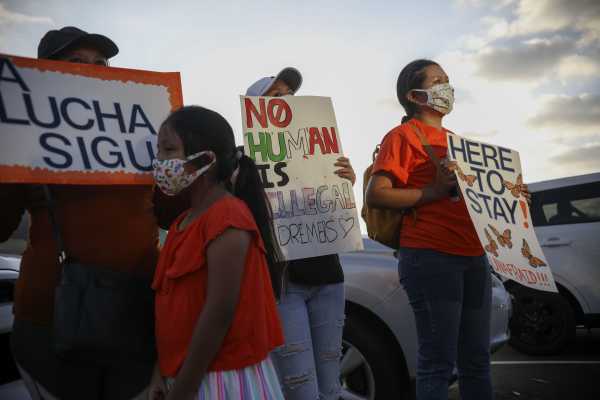 immigrants />
immigrants />
With the White House and Congress now under their control, Democrats are hoping to legalize at least some of the estimated 10.5 million undocumented immigrants living in the US — a long-sought goal that Americans largely support.
A new poll conducted January 29 to February 1 by Vox and Data for Progress (DFP) found that a majority of 1,124 likely voters and an overwhelming proportion of Democrats “strongly” or “somewhat” supported offering a path to citizenship for undocumented immigrants broadly (69 percent and 86 percent, respectively). That support jumps to 72 percent of likely voters and 87 percent of Democrats if you ask them specifically about “DREAMers” who were brought to the US as children. Those findings are consistent with other recent surveys on legalization, including one conducted by Pew in June 2020.
As part of his proposal for comprehensive immigration reform, President Joe Biden has called for creating an eight-year earned path to citizenship for immigrants who were present in the US on or before January 1, 2021, and can pass a background check and pay taxes.
However, it is unlikely to survive in its current form given that it would have to attract 10 Republican votes to proceed in the Senate — where some members have already decried it as “mass amnesty” and criticized its lack of border security provisions — unless Democrats can eliminate the filibuster. While Republicans’ declarations don’t generally reflect American attitudes about legalizing undocumented immigrants, polling has shown that the public does favor certain measures to increase border security, including upping the number of border agents.
Piecemeal legislation to legalize at least some groups of undocumented immigrants might have a better chance at passing.
The DREAM Act, which was first introduced in 2001 and reportedly will be reintroduced this week, would give the estimated 3.6 million DREAMers living in the US the opportunity to apply for provisional protection from deportation, then a green card and, after five years, citizenship. That includes the more than 700,000 who have already been shielded from deportation under the Obama-era Deferred Action for Childhood Arrivals program.
The proposal has garnered bipartisan support in Congress in the past, but it’s not clear whether Republicans will sign on this time.
A group of 100 lawmakers, led by the Congressional Hispanic Caucus, have also called for legislation creating a path to citizenship for the estimated 5 million undocumented essential workers in industries such as meatpacking, farming, and grocery stores. They have been pressing Democratic leadership for the proposal to be included in a budget reconciliation package, which could pass with a simple majority in the Senate and without a single Republican vote.
The poll found that 64 percent of likely voters and 83 percent of Democrats back the proposal, but House lawmakers have so far failed to include the provision in their reconciliation blueprint. As an alternative, Rep. Joaquin Castro (D-TX) is also working on a standalone bill offering a five-year path to citizenship to essential workers.
Immigrant advocates see legislative action on legalization as an imperative, and they’re calling on Biden to push it through by whatever means possible, barring major concessions to Republicans’ demands to bolster immigration enforcement and border security. It appears public opinion is on their side.
Americans also support stimulus payments for mixed-status families
Aside from the issue of legalization, the Biden administration is also pushing to offer $1,200 stimulus checks to all households with people of mixed immigration status, including many who were left out of previous coronavirus relief packages.
That means that any US citizen or green card holder would be eligible for a stimulus check, even if they filed a joint tax return with an undocumented spouse or if they are a dependent of an undocumented person. According to the poll, 64 percent of likely voters and 83 percent of Democrats either “strongly” or “somewhat” support the proposal.
The impact would be significant: An estimated 16.7 million people live in mixed-status households nationwide, including 8.2 million US-born or naturalized citizens. That number includes those who have been shielded from deportation under the Obama-era Deferred Action for Childhood Arrivals program, children and young adults whose parents often don’t have legal status.
Mixed-status households were originally excluded from stimulus relief, until Congress intervened in December to permit citizens and green card holders who filed a joint tax return with an undocumented spouse to receive a check for $600, as well as $600 per dependent child. As with the initial stimulus checks, the benefits phased out for individuals making more than $75,000 and couples making more than $150,000.
It also allowed households with at least one family member who has a Social Security number to retroactively receive checks for up to $1,200 and an additional $500 per child under the previous round of stimulus relief enacted in late March.
But even then, some mixed-status families were still denied relief. US citizen children of undocumented immigrants, for example, did not receive stimulus checks. Biden’s plan would rectify that, but would stop short of sending stimulus checks to undocumented immigrants directly — a prospect that 56 percent of likely voters oppose, a previous Vox/DFP poll found.
As negotiations over the next Covid-19 relief package continue, it’s not clear whether Biden’s proposal will ultimately be included in the final bill. Republicans have sought to narrow the categories of people eligible for stimulus checks, and Biden’s preference is to proceed with a bipartisan relief package, but Democrats could also go it alone by proceeding through budget reconciliation. According to another poll by Vox and Data for Progress, most Americans support passing a relief package quickly, even if it means bypassing Republicans.
Support Vox’s explanatory journalism
Every day at Vox, we aim to answer your most important questions and provide you, and our audience around the world, with information that empowers you through understanding. Vox’s work is reaching more people than ever, but our distinctive brand of explanatory journalism takes resources. Your financial contribution will not constitute a donation, but it will enable our staff to continue to offer free articles, videos, and podcasts to all who need them. Please consider making a contribution to Vox today, from as little as $3.
Sourse: vox.com






